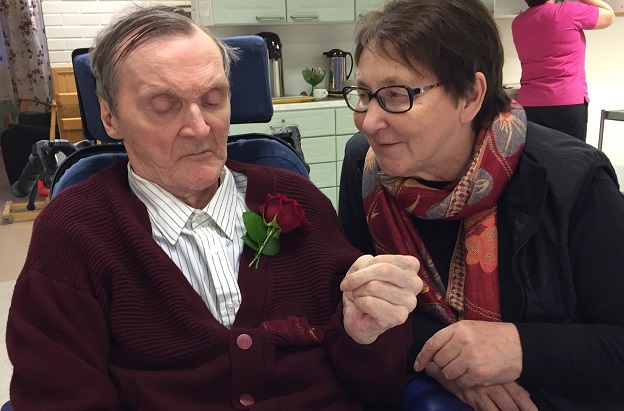One’s own language and culture are keys to understanding and self-determination

When Ristenrauna Magga’s husband’s memory disorder advanced, no service was available to rehabilitate him in his mother tongue, North Sámi. A seminar on disabilities, dementia and services of indigenous people is held in Inari and in the web on 31 August and 1 September.
When you have problems in your cognitive, speech or other functions, it is crucial that you get service in your mother tongue in, for instance, health and social services, and that your cultural background is respected.
Ristenrauna Magga and her late husband Oula Magga are part of the Sámi people in northern Finland. Their mother tongue is North Sámi. When Oula Magga’s memory disorder made it impossible to cope at home, he first moved to the health centre ward, then to service housing. The Maggas found out that service in North Sámi did not exist.
Respondents of the Sámi Barometer had similar experiences. They considered that there were not enough services available in Sámi languages nor enough information about them in Finland.
Need of support varies in different stages of life
“During this year’s presidency at the Council of Nordic Cooperation on Disability, we in Finland want to highlight the situation of indigenous people with disabilities or memory disorders”, says Tea Hoffrén, senior specialist in the Ministry of Social Affairs and Health in Finland.
Language and cultural sensitivity are important for a person to get a correct assessment of their need for services, and the right diagnoses, rehabilitation and care, to mention a few. It is important also to protect a person’s right to self-determination. The right to self-determination is one of the central principles of the UN Convention on the Rights of Persons with Disabilities. The need for services varies during the lifecycle and services in the mother tongue should be available at every stage of life.
The need for services may start from birth. According to the UN Convention on the Rights of the Child, every child has the right to enjoy a full and decent life, in conditions which ensure dignity, promote self-reliance and facilitate the child's active participation in the community.
It is important, that starting from early childhood, children with disabilities or linguistic challenges get support with their communication. It is obvious, that in order to be successful, the support and rehabilitation must be given in the child’s mother tongue.
The mother tongue is central in dementia rehabilitation
The mother tongue is obviously important with memory disorders that come at an older age.
“Think about a memory disorder that is advancing. In order to get an accurate picture of a person’s situation, it is necessary that in cognitive tests questions are asked in the person’s mother tongue and that they are adjusted to culturally understandable forms”, says Pia Pulkkinen, this year’s chair of the Nordic Dementia Network, working at the Finnish Institute for Health and Welfare (THL).
However, this is not always the case. For instance, memory tests are not always available in Sámi languages. Ristenrauna Magga confirms this.
“My husband didn’t get rehabilitation for his memory disorder in our mother tongue. It would have been important especially in the beginning of his condition.”
Sámi people have eight seasons
The Sámi people are the only indigenous people in Finland. Nature has a central meaning in Sámi people’s life. Eight seasons based on the circulation of the sun and the moon set the pace of traditional tasks like reindeer herding. There are three Sámi languages spoken in Finland: North Sámi, Inari Sámi and Skolt Sámi.
“In Finland, the Sámi people’s right to maintain and develop their own language and culture is protected by the Constitution. The right of the Sámi to use their language with the authorities is laid down by Sámi Language Act”, says Sanna Ahola, expert at the Human Rights Centre in Helsinki.
Indigenous peoples’ right to their cultural traditions and customs, and the right to maintain and develop their political, economic and social systems, are recognized for instance in the UN Declaration on the Rights of Indigenous Peoples, the UN International Covenant on Civil and Political Rights and the ILO Indigenous and Tribal Peoples Convention (Finland has not ratified the latter).
The staff needs education and the right attitude
To a large extent, the lack of sufficient language and culturally sensitive services is a structural and administrational issue. However, it is also very much a question of the education and attitude of the professionals that work with clients.
Ristenrauna Magga has a hard time thinking back to an incident that happened when her husband had moved to the health centre ward. At the time of the evening snack, he asked for bread in North Sámi language. The nursing auxiliary refused to give him bread if he would not ask it in Finnish. Ristenrauna Magga, who was visiting, intervened finally with the situation and insisted giving the bread to her husband herself.
“Ever since that I was worried for my husband - would he get food if I wasn’t there to protect him?” she says. “I didn’t dare to make a complaint because I was afraid that it would turn against him. And there was no alternative accommodation available.”
The wise home care worker
However, Ristenrauna Magga is happy that when her husband still lived at home, he got transport services and home-help services where his cultural background was taken into account.
“For a 7 month period, we got a worker from the home care service who was a native North Sámi speaker. She did all she could to activate my husband’s memory”, tells Magga.
“Most important were walks in the nature. Every time, she asked my husband what was actual in reindeer herding in that particular season, what the plants that they saw and the singing birds were called, and they discussed how the wind and clouds were changing.”
Register to our seminar
What obstacles must we overcome to ensure that in the future indigenous people with disabilities or memory disorders would receive language and culturally sensitive services?
Answers will be sought in the seminar “Indigenous peoples – language, culture and life cycle. Disabilities, dementia and services”. The seminar will take place partly in Inari, Finland, and partly as a webinar, on 31 August and 1 September 2021.
Organisers: Nordic Welfare Centre, Nordic Dementia Network, Council of Nordic Cooperation on Disability, Ministry of Social Affairs and Health, Finnish Institute for Health and Welfare, Finnish Sámi Parliament, SámiSoster, Advisory Board for the Rights of Persons with Disabilities VANE and Finnish Human Rights Centre.
The seminar is hosted by the Nordic Welfare Centre, an institution in the Nordic Council of Ministers’ social and health sector. The conference is part of Finland's Presidency of the Nordic Council of Ministers in 2021.
Text: Minna Ahola, Finnish Institute for Health and Welfare
Picture: Anne Näkkäläjärvi
In the picture, Oula Magga is celebrating Father’s Day with his wife Ristenrauna Magga in 2018.




